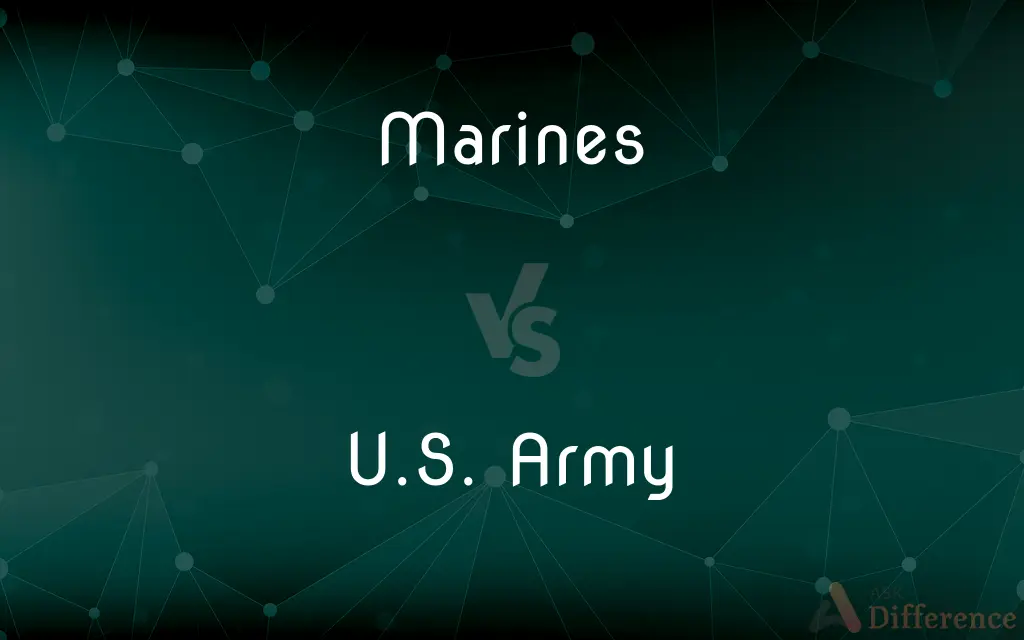Marines vs. U.S. Army — What's the Difference?
By Tayyaba Rehman — Published on October 15, 2023
The Marines are a rapid-response amphibious force of the U.S. Navy, while the U.S. Army is a major branch of the U.S. military focused on land-based operations.

Difference Between Marines and U.S. Army
Table of Contents
ADVERTISEMENT
Key Differences
The Marines are an integral component of the U.S. Navy, specifically trained for swift deployment and amphibious warfare. The U.S. Army, on the other hand, is its own distinct branch of the military, concentrated on extensive land-based campaigns.
Historically, the Marines have been the "first to fight," swiftly responding to conflicts and establishing beachheads. The U.S. Army typically follows with larger, more sustained operations, leveraging its sizable force and resources.
In terms of size, the Marines are smaller and more specialized. Conversely, the U.S. Army is the largest branch of the U.S. military, boasting a wide array of units, specialties, and equipment.
While both the Marines and U.S. Army possess air, ground, and logistics units, the Marines emphasize adaptability with the Navy, ensuring seamless naval-to-land operations. The U.S. Army, however, primarily focuses on dominating land battles and sustained operations.
Comparison Chart
Primary Focus
Amphibious warfare and rapid response
Land-based military operations
ADVERTISEMENT
Affiliation
Component of the U.S. Navy
Independent branch of the U.S. military
Historical Role
First to fight, securing beachheads
Extensive, sustained land operations
Size and Scope
Smaller, specialized force
Largest branch with diverse units and specialties
Operational Emphasis
Seamless naval-to-land operations
Dominance in land warfare and sustained campaigns
Compare with Definitions
Marines
A component of the U.S. Navy, emphasizing versatility in naval and land operations.
The Marines coordinated closely with the Navy for the amphibious assault.
U.S. Army
The primary land warfare branch of the U.S. military.
The U.S. Army deployed troops to the region for a sustained campaign.
Marines
A specialized branch of the U.S. military trained for amphibious warfare.
The Marines were swiftly deployed to establish a beachhead.
U.S. Army
A diverse force with various specialized units, from infantry to cyber operations.
The U.S. Army's Special Forces are trained for unconventional warfare.
Marines
The naval infantry of the U.S. armed forces, adept at rapid response.
The Marines pride themselves on being the first to face challenges.
U.S. Army
An independent military branch with a history dating back to the American Revolution.
The U.S. Army played a crucial role in securing American independence.
Marines
The "few and the proud," known for rigorous training and discipline.
The Marines undergo intense training to prepare for various combat scenarios.
U.S. Army
The primary ground force of the U.S., responsible for defending national interests.
The U.S. Army is constantly evolving to meet new global challenges.
Marines
A force focused on expeditionary warfare and forward deployment.
The Marines were stationed overseas, ready for quick deployment.
U.S. Army
The largest component of the U.S. armed forces, focused on terrestrial combat.
The U.S. Army maintains a vast array of equipment and bases worldwide.
Marines
Of or relating to the sea
Marine exploration.
Marines
Native to, inhabiting, or formed by the sea
Marine animals.
Marines
Relating to a system of oceanic habitats coextensive with the continental shelf, ranging from deep water to unprotected coastlines and characterized along its landward edge by exposure to wave action and tidal currents and by the absence of trees, shrubs, or emergent vegetation.
Marines
Of or relating to shipping or maritime affairs.
Marines
Of or relating to sea navigation; nautical
A marine chart.
Marines
Of or relating to troops that serve at sea as well as on land, specifically the US Marine Corps.
Marines
A soldier serving on a ship or at a naval installation.
Marines
Often Marine A member of the US Marine Corps.
Marines
The mercantile or naval ships or shipping fleet of a country.
Marines
The governmental department in charge of naval affairs in some nations.
Marines
A painting or photograph of the sea.
Marines
Plural of marine
Marines
Alternative form of marine corps
Common Curiosities
Which is the largest branch of the U.S. military?
The U.S. Army is the largest branch of the U.S. military.
Are the Marines part of the Navy?
Yes, the Marines are a component of the U.S. Navy.
How old is the U.S. Army in terms of its establishment?
The U.S. Army was established on June 14, 1775, during the American Revolution.
How does the U.S. Army differ from the Marines in terms of operations?
The U.S. Army is focused on extensive land-based campaigns, while Marines emphasize swift deployment.
Do the Marines have their own aircraft?
Yes, the Marines possess their own air units to support their operations.
Does the U.S. Army have specialized units like the Special Forces?
Yes, the U.S. Army has various specialized units, including the Special Forces, known for unconventional warfare.
What's the primary focus of the Marines?
The Marines are primarily trained for amphibious warfare and rapid response.
How do the roles of the Marines and U.S. Army overlap in warfare?
While both can engage in ground combat, Marines often initiate conflict with rapid deployment, while the U.S. Army follows with sustained operations.
Which force often describes themselves as the "first to fight"?
The Marines commonly use the term "first to fight" to describe their rapid response role.
Is the training for Marines considered rigorous?
Yes, the Marines undergo intense and rigorous training, preparing them for various combat scenarios.
Share Your Discovery

Previous Comparison
Commercial Bank vs. Non-Commercial Bank
Next Comparison
Inventory Management vs. Inventory ControlAuthor Spotlight
Written by
Tayyaba RehmanTayyaba Rehman is a distinguished writer, currently serving as a primary contributor to askdifference.com. As a researcher in semantics and etymology, Tayyaba's passion for the complexity of languages and their distinctions has found a perfect home on the platform. Tayyaba delves into the intricacies of language, distinguishing between commonly confused words and phrases, thereby providing clarity for readers worldwide.














































